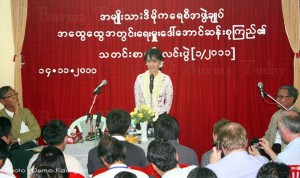Calling the Regime’s Bluff
By Burma Partnership • November 14, 2011 In a press conference today, Daw Aung San Suu Kyi spoke about the expected release of political prisoners and refrained from answering any questions about whether the National League for Democracy (NLD) would re-register as a political party. The party has recently held several internal meetings to discuss the pending decision about re-registration and the possibility of running in the by-elections to be held before the end of the year, and will meet again on 18 November. At the moment, it remains unclear what the NLD will decide.
In a press conference today, Daw Aung San Suu Kyi spoke about the expected release of political prisoners and refrained from answering any questions about whether the National League for Democracy (NLD) would re-register as a political party. The party has recently held several internal meetings to discuss the pending decision about re-registration and the possibility of running in the by-elections to be held before the end of the year, and will meet again on 18 November. At the moment, it remains unclear what the NLD will decide.
While there has been a lack of transparency around the recent meetings between Daw Aung San Suu Kyi and the regime, the two sides appear to be on unequal playing fields. It seems probable that the two sides have been negotiating next steps, with the regime using the release of remaining political prisoners as a bargaining chip for the re-registration of the NLD.
This is problematic because the regime on one hand continues to deny the existence of political prisoners, and on the other, officials often refer to a severely shortened list of “prisoners of conscience” that doesn’t include many who were arrested under trumped-up criminal charges despite clearly political motives. Officials close to the regime, including Presidential Advisor Ko Ko Hlaing, have said that there were only 600 “prisoners of conscience” in the country, half of whom were released in last month’s amnesty. And yet, the regime refuses to share its list of current detainees, a step that would show that it is sincere about its claimed intentions of achieving democracy and national reconciliation, said the Assistance Association for Political Prisoners – Burma (AAPP) in a press release and briefer this week. AAPP called for “all bodies and organizations that have been compiling information on political prisoners… to work together in a spirit of mutual respect with the aim of bridging the deep divide on political prisoner numbers.” The organization further highlighted that “the emphasis should be on eradicating the repressive policy that violates fundamental civil, political, and human rights” rather than solely on the numbers.
Another release of political prisoners does seem to be on the horizon though. In a letter published on 12 November in the state-run newspaper, the New Light of Myanmar, the Chairman of the National Human Rights Commission (NHRC) appealed to President Thein Sein to release more “Prisoners of Conscience… as a reflection of his magnanimity.” It must be noted that the regime’s previous amnesty, which included the release of 230 political prisoners, came one day after a similar letter from the NHRC. An official from the interior ministry said that the regime was planning to do exactly as the NHRC appealed in its letter, and that the release would be “very soon.” The striking similarity of the two officials’ comments reveals further grounds for serious concerns about the independence and autonomy of the NHRC.
Many expected that the next release of prisoners would be today but there has not yet been any confirmation from inside Burma. “The authorities have not contacted us but we heard that another round of amnesty is coming soon. Our hopes are high again but nothing is certain here,” said one of 88 Generation leader Min Ko Naing’s sisters.
With President Thein Sein preparing to depart for the ASEAN Summit in Bali, Indonesia, it is expected that the regime will release another round of political prisoners in a last-ditch effort to secure Burma’s chairmanship of the bloc in 2014. Civil society organizations from Burma and the ASEAN region have repeatedly called on the regional bloc not to reward the regime for its superficial reforms, including the release of political prisoners, while armed conflict rages in the country’s ethnic nationality areas.
In a press release today, the President of the ASEAN Inter-Parliamentary Myanmar Caucus drew further attention again to crimes against humanity and war crimes being committed in Burma’s ethnic areas. “Gross human rights violations against the ordinary people in the ethnic areas continue despite lip service towards reform from Naypyidaw,” said Ms. Eva Kusuma Sundari. “If anything, life under this regime is worse for many ethnic minorities and vulnerable people than it was before.”
If the regime were genuinely striving for democracy and national reconciliation in Burma, it would not be using the release of political prisoners as a bargaining chip with Daw Aung San Suu Kyi or a last card to play for the ASEAN chairmanship. Nor would it be waging war against ethnic nationalities and committing human rights abuses against its own people. The regime can no longer bluff its way out of this hand.
Tags: ASEAN Chairmanship, Burma Partnership, Myanmar National Human Rights Commission, National League for Democracy, Political PrisonersThis post is in: Blog
Related PostsWhere is the Benefit for the People of Burma?
Myanmar Prepares for ASEAN Chairmanship in 2014
AIPMC Welcomes Cambodia as ASEAN Chair but Urges Rapid Reforms on Human Rights and Democracy
Myanmar must be ready to act as face of ASEAN to the world
Statement by the Myanmar National Human Rights Commission









 All posts
All posts